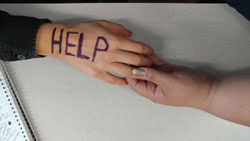President of the East Coast Gang Investigators Association Edwin Torres spoke with members of the Guardians Club regarding organized gang activity within the state of New Jersey as well as nationwide in Bey Hall, on Feb. 19.
Torres is also a special agent for the NJ Commission of Investigation, as well as a former lieutenant with the NJ Juvenile Justice Commission where he commanded the Gang Management Unit.
Serving 33 years in law enforcement, Torres began his career as a housing unit officer at The New Jersey Training School (NJTS), the largest single correctional facility for young men in the state of New Jersey, according to Torres, where he also founded a specialized gang unit.
“I started a gang unit because right in the middle of the 1990’s, our facility got crushed by the Bloods [street gang],” Torres said. “The Bloods started exploding all over New Jersey.”
1990’s era law enforcement officers did not believe in the existence of “real” Blood street gang members operating in the state of New Jersey, according to Torres. Convinced the juveniles were not legitimate and merely faking their gang affiliation, less focus was placed around their rise.
“Fast forward from 1993 to now, gangs account for at least 15 percent of all the homicides in the state of New Jersey,” Torres said. “We fell asleep at the switch.”
Torres explained the methods in which street gangs will attempt to rally their communities behind their illegal activity, capitalizing on the misconduct of police officers to propose their gang operations as a better alternative for neighborhood protection.
“They say, ‘look at this, we told you we’re here to defend the community, we told you the government is bad,’ and they use that to recruit more members,” Torres said. “It’s definitely an issue with the communities that law enforcement serves, and I want to stress the word serve, as we’re not serving the way we’re supposed to. We have to do more, we have to do better, and gangs have capitalized on that.”
The transition from street gangs straying away from focusing their efforts on drug enterprises has left law enforcement officers uneasy, Torres explained, as drug related enterprises had at least left behind a consistent sense of predictability in their actions.
“The problem is when you have a drug dealing organization, it’s something that law enforcement knows how to work with and deal with,” Torres said. “When you have an organization that doesn’t have a drug model, then how do you get famous in [your community] if you’re not dealing drugs or making money? How do I strike fear into the heart and get a reputation, if I’m not dealing and making money that way? The only way to get famous is by violence, usually through robbing, mugging and shooting. That violence is 100 percent unpredictable.”
Violence is often attached to territory and can hinder the selling of narcotics, according to Torres. “Violence is bad for drug dealing, no one buys dope if people are shooting at each other on the corner. I’m not coming to your neighborhood, I’m buying somewhere else.”
Street gangs which, operate through drug enterprises, will attempt to pat down violence in their areas of operation as it also helps to lessen attention from law enforcement as well, according to Torres. However, if you are part of a street gang who is simply trying to acquire attention and notoriety, “… then violence is all you need,” Torres said. “That’s what we see from a lot of these cliques and crews that aren’t involved in the drug trade.”
Shore towns consistently have issues during their peak tourism visitation months due to gang activity, as members from locations such as New York, Pennsylvania, and even Connecticut converge on those areas, according to Torres.
“A lot of the fights they see is what we call “G-Checking” in the gangster world,” Torres said. G-Checking refers to when a gang member asks a suspected fellow gang member questions only one within their organization would be aware of, exposing any illegitimate members.
“If I’m a Blood [gang member] from New York City, or a Crip [member] or a Latin King [member], and I see you wearing my [gang affiliated] colors, I’m going to approach you and ask you some questions,” Torres said. “If you don’t have the right answers, I’m going to [beat] you up, it’s my responsibility, in my gang which I’ve sworn allegiance to, to protect my colors. We’ve had situations where people have walked that walk, talked that talk, and gotten shot for looking like a gang member.”
Lauren Deinhardt, junior criminal justice student and Guardians Club Social Media Chair, expressed her gratitude in Torres’ Guardians Club appearance.
“I thought it was very informative and necessary,” Deinhardt said. “Gang culture is something that our society unfortunately has to deal with all the time, and having Torres come in was definitely great for our criminal justice students as well as the whole community.”



